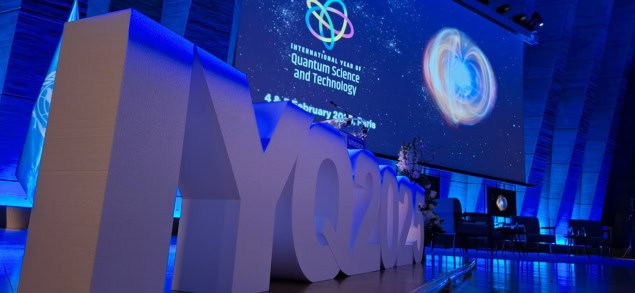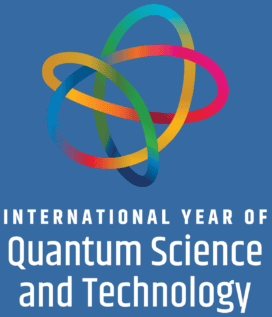
More than 800 researchers, policy makers and government officials from around the world gathered in Paris this week to attend the official launch of the International Year of Quantum Science and Technology (IYQ). Held at the headquarters of the United Nations Educational, Scientific and Cultural Organisation (UNESCO), the two-day event included contributions from four Nobel prize-winning physicists – Alain Aspect, Serge Haroche, Anne l’Huillier and William Phillips.
Opening remarks came from Cephas Adjej Mensah, a research director in the Ghanaian government, which last year submitted the draft resolution to the United Nations for 2025 to be proclaimed as the IYQ. “Let us commit to making quantum science accessible to all,” Mensah declared, reminding delegates that the IYQ is intended to be a global initiative, spreading the benefits of quantum equitably around the world. “We can unleash the power of quantum science and technology to make an equitable and prosperous future for all.”
The keynote address was given by l’Huillier, a quantum physicist at Lund University in Sweden, who shared the 2023 Nobel Prize for Physics with Pierre Agostini and Ferenc Krausz for their work on attosecond pulses. “Quantum mechanics has been extremely successful,” she said, explaining how it was invented 100 years ago by Werner Heisenberg on the island of Helgoland. “It has led to new science and new technology – and it’s just the beginning.”

Some of that promise was outlined by Phillips in his plenary lecture. The first quantum revolution led to lasers, semiconductors and transistors, he reminded participants, but said that the second quantum revolution promises more by exploiting effects such as quantum entanglement and superposition – even if its potential can be hard to grasp. “It’s not that there’s something deeply wrong with quantum mechanics – it’s that there’s something deeply wrong with our ability to understand it,” Phillips explained.
The benefits of quantum technology to society were echoed by leading Chinese quantum physicist Jian-Wei Pan of the University of Science and Technology of China in Hefei. “The second quantum revolution will likely provide another human leap in human civilization,” said Pan, who was not at the meeting, in a pre-recorded video statement. “Sustainable funding from government and private sector is essential. Intensive and proactive international co-operation and exchange will undoubtedly accelerate the benefit of quantum information to all of humanity.”
Leaders of the burgeoning quantum tech sector were in Paris too. Addressing the challenges and opportunities of scaling quantum technologies to practical use was a panel made up of Quantinuum chief executive Rajeeb Hazra, QuEra president Takuya Kitawawa, IBM’s quantum-algorithms vice president Katie Pizzoalato, ID Quantique boss Grégoire Ribordy and Microsoft technical fellow Krysta Svore. Also present was Alexander Ling from the National University of Singapore, co-founder of two hi-tech start-ups.

Explore the quantum frontier: all about the International Year of Quantum Science and Technology 2025
“We cannot imagine what weird and wonderful things quantum mechanics will lead to but you can sure it’ll be marvellous,” said Celia Merzbacher, executive director of the Quantum Economic Development Consortium (QED-C), who chaired the session. All panellists stressed the importance of having a supply of talented quantum scientists and engineers if the industry is to succeed. Hamza also underlined that new products based on “quantum 2.0” technology had to be developed with – and to serve the needs of – users if they are to turn a profit.
The ethical challenges of quantum advancements were also examined in a special panel, as was the need for responsible quantum innovation to avoid a “digital divide” where quantum technology benefits some parts of society but not others. “Quantum science should elevate human dignity and human potential,” said Diederick Croese, a lawyer and director of the Centre for Quantum and Society at Quantum Delta NL in the Netherlands.

The cultural impact of quantum science and technology was not forgotten in Paris either. Delegates flocked to an art installation created by Berlin-based artist and game developer Robin Baumgarten. Dubbed Quantum Jungle, it attempts to “visualize quantum physics in a playful yet scientifically accurate manner” by using an array of lights controlled by flickable, bendy metal door stops. Baumgarten claims it is a “mathematically accurate model of a quantum object”, with the brightness of each ring being proportional to the chance of an object being there.

This article forms part of Physics World‘s contribution to the 2025 International Year of Quantum Science and Technology (IYQ), which aims to raise global awareness of quantum physics and its applications.
Stayed tuned to Physics World and our international partners throughout the next 12 months for more coverage of the IYQ.
Find out more on our quantum channel.



